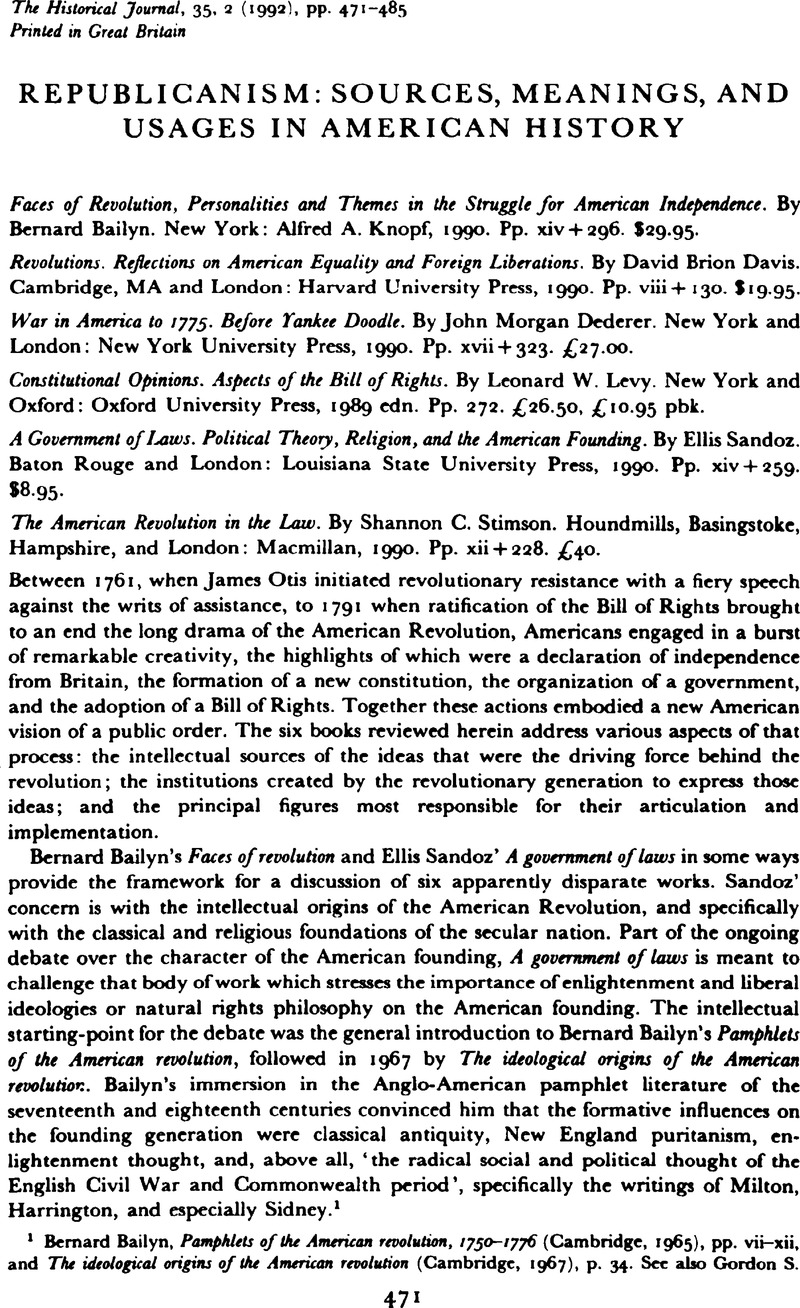No CrossRef data available.
Published online by Cambridge University Press: 25 March 2010

1 Bailyn, Bernard, Pamphlets of the American revolution, 1750–1776 (Cambridge, 1965), pp.vii–xii andGoogle ScholarThe ideological origins of the American revolution (Cambridge, 1967), p. 34Google Scholar. See also Wood's, Gordon seminal The creation of the American republic, 1776–1787 (Chapel Hill, N.C., 1969), for American thought respecting governmentGoogle Scholar.
2 Pocock, J. G. A., The Machiavellian moment. Florentine political thought and the Atlantic republican tradition (Princeton, N.J., 1975), p. 462Google Scholar.
3 Appleby, Joyce, Capitalism and the new social order (New York and London, 1984)Google Scholar.
4 Bailyn, Bernard, The peopling of British North America (New York, 1986)Google Scholar, and Voyagers to the west (New York, 1986)Google Scholar.
5 Nash, Gary B., The urban crucible: social change, political consciousness, and the origins of the American revolution (Cambridge, 1979)CrossRefGoogle Scholar.
6 Heimert, Alan, Religion and the American mind, from the Great Awakening to the revolution (Cambridge, 1966)Google Scholar; Hatch, Nathan O., The sacred cause of liberty: republican thought and the millennium in revolutionary New England (New Haven, 1977)Google Scholar; Strout, Cushing, The new heavens and new earth (New York, 1974)Google Scholar.
7 See Frey, Sylvia R., ‘Liberty, equality, and slavery: the paradox of the American revolution’ in Greene, Jack P., ed., The American revolution: its character and limits (New York, 1987); pp. 230–52Google Scholar.
8 See for example Brown, Richard D., Knowledge is power: the diffusion of information m America, 1700–1865 (New York, 1989)Google Scholar.
9 For a general synthesis of the literature on the subject see Lender, Mark Edward and Martin, James Kirby, A respectable army: the military origins of the republic, 1763–1789 (Arlington Heights, 1982)Google Scholar.
10 Hartz, Louis, The liberal tradition in America: an interpretation of American political thought revolution (1st edn. New York, 1955)Google Scholar; Huntington, Samuel P., Political order in changing societies (Haven, 1968)Google Scholar; Reid, John Phillip, In defiance of the law: the standing army controversy, the two and the coming of the American revolution (Chapel Hill, N.C., 1981)Google Scholar.
11 Two essays in a recent collection of essays commemorating the 250th anniversary of the Zenger trial offer new assessments of the trial's importance. Ellen Jones, ‘Decoding the Zenger trial: Andrew Hamilton's “Fraudful dexterity” with language’, argues that the importance of the trial was in the multiplicity of legal terms introduced by Hamilton. Morris Forkosch, ‘Zcngcr versus Crosswcll and the rule of law’, demonstrates that the Henry Crosswell case of 1803–5 was more legally significant for freedom of the press than the Zenger case, in Pencak, William and Holt, Wythe W. Jr, eds., The law in America, 1607–1861 (New York, 1989)Google Scholar.
12 Dunn, John, ‘The politics of Locke in England and America in the eighteenth century’, in Yolton, John W., ed., John Locke: problems and perspectives (Cambridge, 1969); pp. 45–80Google Scholar, the ‘huge influence’ of Locke's epistemology. See also Yazawa, Melvin, From colonies commonwealth. Familial ideology and the beginnings of the American republic (Baltimore and London, 1985)Google Scholar.
13 Shalhope, Robert E., The roots of democracy. American thought and culture, 1760–1800 (Boston, 1990), p. xiGoogle Scholar.
14 Dworetz, Steven M., The unvarnished doctrine: Locke, liberalism, and the American revolution (Durham, N.C., 1990)Google Scholar.
15 Shalhope, , Roots of democracy, p. xiiGoogle Scholar.